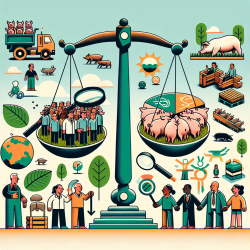In the world of environmental health research, practitioners often face ethical dilemmas that challenge their social responsibility. A significant study titled "Social responsibility and research ethics in community-driven studies of industrialized hog production" sheds light on these challenges and offers valuable lessons for researchers and practitioners alike.
The Ethical Dilemma in Environmental Health Research
The study conducted by Steve Wing at the University of North Carolina highlights the ethical conflicts faced by researchers working with communities affected by industrialized hog production. These communities often consist of low-income individuals or people of color who bear the brunt of environmental injustices. Researchers, typically from privileged institutions, find themselves in situations where their loyalties are tested. The study emphasizes that these conflicts can threaten researchers' self-interest and raise unique social and ethical issues.
Key Lessons for Practitioners
As practitioners, it is crucial to understand and implement ethical research practices that prioritize community interests. Here are some key takeaways from the study:
- Community-Driven Partnerships: Engage with communities as equal partners in research projects. This approach not only addresses ethical concerns but also enhances the social responsibility of both researchers and their institutions.
- Transparency and Communication: Maintain open lines of communication with community members throughout the research process. Transparency builds trust and ensures that all parties are informed about the study's goals and potential impacts.
- Cultural Sensitivity: Be aware of cultural differences and respect the values and beliefs of the communities you work with. This sensitivity is crucial for ethical research practices.
- Institutional Support: Advocate for institutional review boards to be better equipped to handle ethical issues involving entire communities, not just individual participants.
Encouraging Further Research
The study encourages practitioners to delve deeper into understanding how community-driven research can reshape ethical practices. By fostering partnerships with affected communities, researchers can address complex ethical dilemmas more effectively.
If you're a practitioner looking to improve your skills and enhance your research ethics, consider exploring further studies on community-driven research models. These models not only offer solutions to ethical challenges but also promote social justice and equity in research practices.
To read the original research paper, please follow this link: Social responsibility and research ethics in community-driven studies of industrialized hog production.










